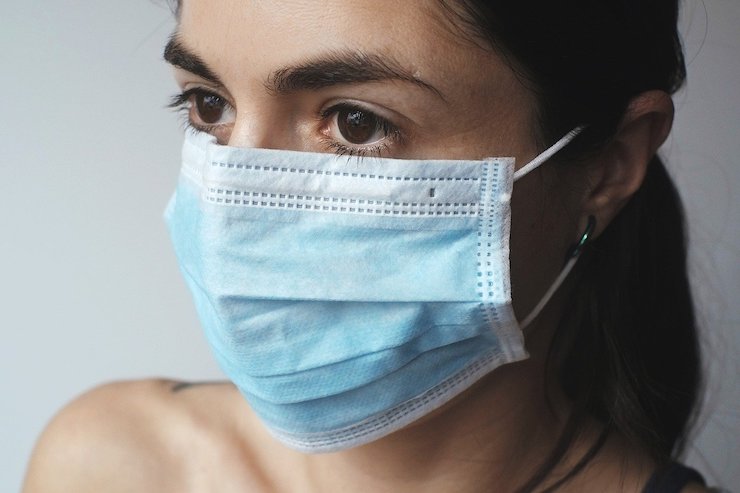Local Business Coronavirus Requirements Can Lead to Negative Reviews

From mask requirements to social distancing, local business coronavirus requirements can be offsetting to some customers. But as the US sets daily records each week for new coronavirus infections, top infectious disease expert Dr. Anthony Fauci is calling for mask-wearing mandates to save American lives. What’s more, many states have already issued guidelines urging or obligating brick-and-mortar businesses to require customers and employees to wear masks and practice social distancing. And many businesses are facing negative reviews due to it.
But when Teter’s Faucet Parts Center, a plumbing supply store in Dallas, Texas, implemented its own mask requirement, the store found itself the subject of a one-star review that will lower its overall rating. The review came with a written attack that now pops up when customers click on reviews for the business on Google Search Engine Results Pages.

“They don’t believe in the freedoms America provides,” a disgruntled, apparently non-mask-wearing customer recently wrote, deriding the business as a “Communist-based company.”
In response, the owner of the business wrote that the store, like many others, is requiring masks or face coverings while Covid-19 infections, which have been running rampant in Texas the past few weeks, continue to spread. “This temporary rule is for the safety of other customers and our employees and their families,” the owner wrote.
Reputation management expert and GatherUp co-founder Mike Blumenthal posted the exchange on Twitter. “The review space has never been harder than right now,” he wrote.
Google initially responded to the pandemic’s rapid spread in the US by temporarily shutting down access to reviews. The search giant also equipped businesses with ways to communicate extra effectively with customers about safety precautions and adjusted service options.
Google added check marks to Knowledge Panels to allow restaurants to signal efficiently whether they are open for dining in, take-out, and delivery. Research previously reported on Street Fight also shows that calls to businesses have skyrocketed during the pandemic as customers try to figure out just what their local businesses are offering in the wake of shutdowns.

But none of the above can prevent customers angry about coronavirus-related restrictions from lashing out at businesses attempting to follow public health best practices or the letter of the law.
Phoenix site AZ Family reported on more than a dozen alleged instances of critical reviews as a result of coronavirus restrictions. Some businesses, ever the antagonist of review sites, especially Yelp, appear to have anticipated the problem. New York’s Prince Street Pizza warned in March that there will be a “special place in Hell” for sour customers writing Yelp reviews during the pandemic.
“We’ve had several clients experience issues with reviews that complain about coronavirus-related issues, sometimes in ways that are clearly inflammatory,” said Damian Rollison, Street Fight columnist and senior VP of product strategy at reputation management firm Brandify. Brandify serves brands with thousands of brick-and-mortar locations across the US. “It’s unfortunate to see businesses that are already struggling having to deal with this additional level of stress,” Rollison added.
The problem does not stop at negative reviews for businesses taking a proactive approach toward safety, Blumenthal said. Businesses have been criticized as well for not implementing sufficiently robust coronavirus-related restrictions. The problem is especially acute for multi-location brands and franchises, which must struggle to ensure that store operators at all their locations are enforcing corporate leadership’s recommended protocols.
Fortunately, there is at least some recourse for businesses criticized and slapped with one-star reviews for taking sometimes mandatory safety precautions. Businesses can report reviews that may be interpreted as violating the review platform’s guidelines. Google, for example, bans “off-topic” reviews that reflect political or social commentary as well as reviews that harass or intimidate.
Rollison said some coronavirus-related reviews may fall into banned territory, providing a pathway for business owners and operators to get them taken down. Google has begun informing businesses when it strikes reviews from the public record.
Business owners can flag a Google review as inappropriate in the Google My Business dashboard. In the ideal case, the business owner will receive an email indicating the review was removed. If not, the owner can air their concerns in the GMB forum and hope a Google Product Expert will elevate their case. Blumenthal said this is precisely what happened in the case of Teter’s Faucet Parts Center. He said he assumes Google will remove the review and that Yelp would do the same in this case.
The tricky case of coronavirus safety requirements and reviews is also one where technology can shine. Working with GatherUp, a multi-location food company auto-tagged words like masks and gloves. The system highlighted reviews with that content, and the company discovered negative reviews that showed certain locations were not following corporate standards. Corporate was able to remedy the situation. “A win all-around and a good example of ‘leaning into’ the problem,” Blumenthal said.
At the very least, businesses will on balance do well to follow public health best practices. Negative reviews can come from either side (too many restrictions or not enough), and safeguarding one’s customers is a better ethical and operational bet than putting them at risk. Local business coronavirus requirements can be seen as being a positive for customer satisfaction.


